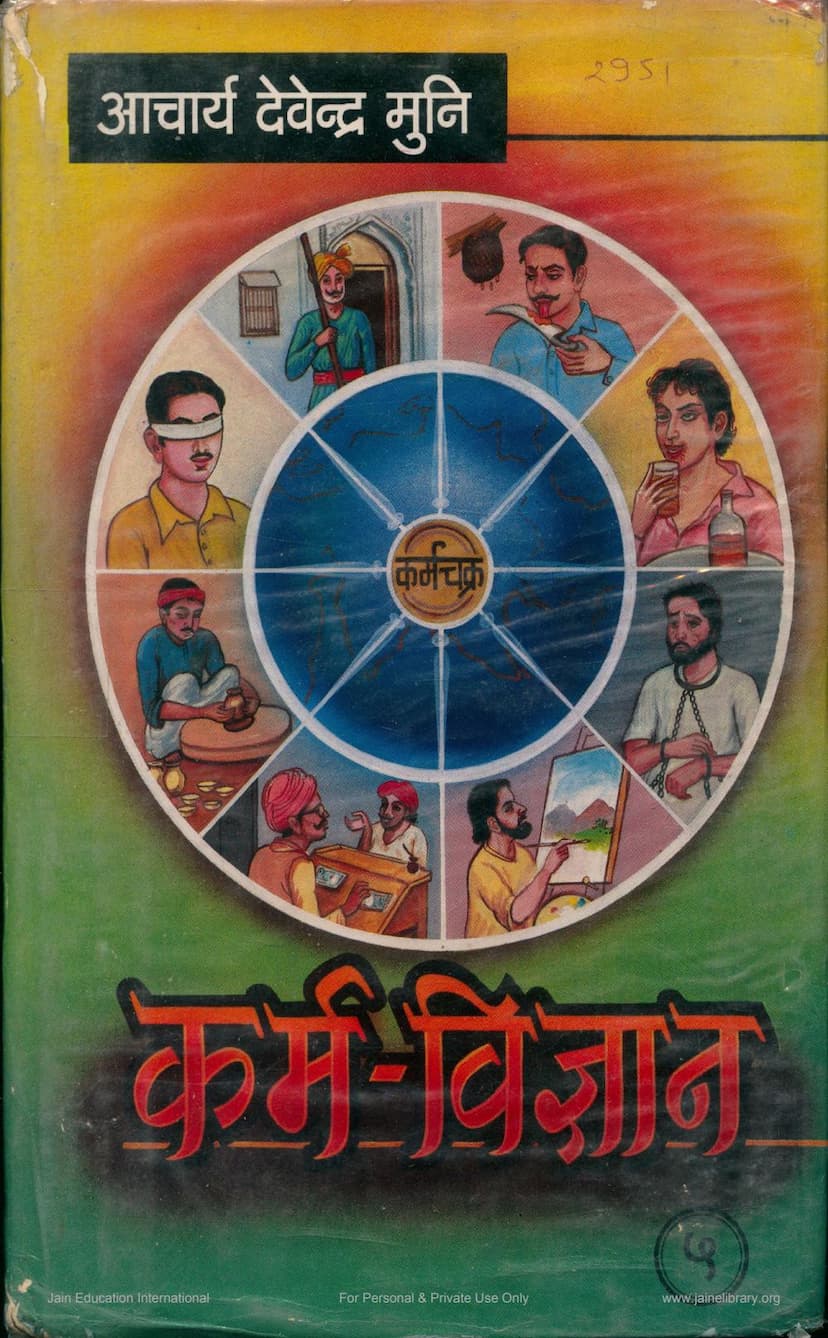Karm Vignan Part 05
Added to library: September 2, 2025

Summary
This is a comprehensive summary of the Jain text "Karm Vigyan Part 05" by Acharya Devendramuni, based on the provided pages.
Book Title: Karm Vigyan Part 05 Author: Acharya Devendramuni Publisher: Shri Tarak Guru Jain Granthalay, Udaipur Catalog Link: https://jainqq.org/explore/004246/1
Overview:
This volume, "Karm Vigyan Part 05," is the fifth installment of a larger work by Acharya Devendramuni on the profound subject of Karma. It focuses on the special states and conditions of karma bondage, delving into the intricate psychological and philosophical aspects of how karmas bind the soul. The book is praised for its authoritative, scientific, and logical approach, aiming to unravel the complexities of bondage and liberation.
Key Themes and Content:
-
The Nature of Karma and Bondage:
- The text begins by establishing that "Dharma" (religion/righteousness) and "Karma" (action and its consequences) are fundamental concepts in the spiritual world, governing the reactions of the sentient universe. Dharma leads to liberation, while Karma leads to bondage.
- It emphasizes that understanding the principle of Karma is crucial for comprehending Dharma and the path to liberation.
-
Critique of Environmental and Hereditary Theories:
- The introductory sections of the book critically examine prevailing scientific theories from the 16th century onwards, such as environmental determinism (Sociology, Psychology) and heredity (Genetics, Biology), in explaining human differences and problems.
- The text points out that theories attributing all human characteristics to environment or genetics are insufficient, citing examples where individuals raised in conducive environments became antisocial, and vice versa. It also highlights biological and historical instances that challenge these theories, such as exceptional talents from ordinary backgrounds or varying traits within the same family.
- The author poses the central question: Why do such variations and peculiarities exist in humans, and why is no two individuals identical?
-
The Jain Karma Theory as a Solution:
- Jain Karma Theory is presented as the logical and satisfactory answer to these unanswered questions. It asserts that the fundamental cause of these variations and complexities lies in the karmas that bind the soul.
- The text introduces the eight principal types of karmas (Jnānāvaraṇīya, Darśanāvaraṇīya, Vedanīya, Mohanīya, Āyu, Nāma, Gotra, and Antarāya) and mentions their various sub-types (bandha, udaya, udīraṇā, saṅkramaṇa), highlighting that the soul binds karmas at every moment.
- A core principle emphasized is that the unique Bhavas (mental states, intentions, and efforts) and Adhyavsayas (specific mental exertions) of each individual soul are the reason why no two souls' karma bondage and its consequences are identical. These infinite variations in mental states lead to infinite variations in karma bondage and its fruition.
-
Focus of Part 5: Special Conditions of Karma Bondage:
- This particular volume (Part 5) specifically focuses on the "Special Conditions of Karma Bondage."
- It will analyze the diversity and intricacies of karma bondage, including:
- Dhruva (Permanent) and Adhruva (Temporary) Nature of Karmas: Discussing which karmic natures are always binding, which are temporary, which have permanent or temporary manifestation (udaya), and which have permanent or temporary presence in the soul's state (sattā).
- Parāvartamānā and Aparāvartamānā Prakṛtis: Analyzing karmic natures that undergo transformation versus those that remain invariant.
- Four Karma Natures Based on Vipāka (Fruition Power): Detailing karmic natures based on their capacity to yield results.
- Various Transformable States of Karma Bondage: Exploring how bondage itself can change.
- Indicators of Diverse States of Bonded Souls: Discussing the classifications and states of souls within the 14 Jīvasthānas (realms of existence), Guṇasthānas (stages of spiritual progress), and Mārgaṇāsthānas (avenues of investigation).
- Psychological Aspects: The text emphasizes the psychological background in analyzing these special conditions.
-
The Role of Jain Psychology:
- The concept of Mārgaṇāsthānas and Guṇasthānas is highlighted as a unique key to Jain psychology. These are described as thermometers measuring the fluctuations of the soul's mental states (bhāvas/adhyavsayas), allowing for the analysis of its tendencies and activities.
- Jīvasamāsa describes the state of the soul, Mārgaṇāsthānas are used for the soul's investigation, and Guṇasthānas are the steps of spiritual progress leading from the lowest to the highest state.
-
Dedication:
- The book is dedicated to the sacred memory of Upādhyāya Shri Pushkar Muni Ji Maharaj, acknowledging his profound influence and guidance.
-
Acknowledgement of Support:
- The publication and printing of "Karm Vigyan" are made possible by the generous support of Shri Tarak Guru Jain Granthalay, Udaipur.
- Special mention and deep gratitude are extended to Dr. Champalalji Desarda, an industrialist and philanthropist, for his significant contribution to the publication of this and other volumes of Acharya Devendramuni's literature. His devotion to the Gurudev's work is highly appreciated.
-
Chapter/Content Outline (from the Table of Contents provided):
- The fifth part covers chapters on the diversity and peculiarity of karma bondage, classifications of karmic natures based on their permanent/temporary states, transformation of natures, karmas based on fruition, transformable states of bondage, indicators of bonded souls' states, classification of souls in 14 Jīvasthānas, Guṇasthānas, Mārgaṇāsthānas, bond ownership based on Guṇasthānas, the journey from Moha to Moksha (14 stages), gradual stages of self-development in various philosophies, Guṇasthānas in relation to Jīvasthānas, bond-sattā-udaya-udīraṇā in Guṇasthānas, the five types of Bhāvas (states) and their role in progress, the two paths of ascension (Upashamana and Kṣapaṇa), Ṛṇānubandha (karmic connections/debts), and the various forms of Raga (attachment) and Dvesha (aversion) bondage.
Significance:
This volume aims to provide a comprehensive understanding of the specialized conditions under which karma binds the soul, offering a scientific and logical framework based on Jain philosophy. It seeks to resolve complex questions about life's diversities and predicaments, pointing towards the profound insights of the Jain karma theory. The detailed analysis of Jīvasthānas, Guṇasthānas, and Mārgaṇāsthānas, along with the psychological underpinnings, makes this volume a valuable resource for anyone seeking to understand the mechanics of karma and the path to spiritual liberation.